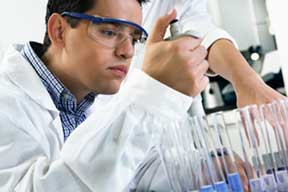Advanced Lab Technique May Expedite Rape Kit Testing

There’s an estimated backlog of 400,000 untested rape kits in the U.S. — bags of evidence collecting dust in storage lockers and labs.
Detroit alone had 11,303 unprocessed rape kits, each containing semen, saliva, hair or other evidence of rape. Out of the first 153 kits entered into the national database called CODIS, Worthy found 20 serial rapists.
Part of the problem is the lack of resources, from funding to staff. But the laborious process of extracting and separating two sets of DNA (the rape victim’s and the perpetrator’s) from one swab sample is time-consuming and tedious.
However, Dr. Bruce McCord, associate director of the International Forensic Research Institute at Florida International University (FIU), is applying new technology from Pressure BioSciences Inc. to improve the quality and speed of processing rape kits. Improving testing methods is so important that the Office of Justice Programs of the Department of Justice awarded a $349,000 grant to support further development of the new technique, known as pressure cycling technology (PCT), at FIU.
PCT could expedite rape kit testing by avoiding the complex extraction of both male and female cells from the swab, to collect the assailant’s DNA.
“Our goal is to develop a PCT-based method that can selectively disrupt sperm cells in mixtures containing female cells, without the need to first separate the cells,” explains McCord. “This unique approach has the potential to significantly decrease costs and improve results.”
“We’re impressed with Dr. McCord’s findings on the potential of PCT to enhance rape kit processing,” says Dr. Henry Lee, one of the world’s leading forensic scientists. “We are excited to examine the potential of PCT in improving forensic evidence, particularly DNA.”
PCT’s “unique approach,” which uses cycled pressure to exquisitely control molecules in biological samples, extends well beyond forensics. PCT could help develop better prescription drugs, improve vaccines and enable more accurate research into diseases and disorders such as Alzheimer’s disease, heart disease, and cancer.
Despite such promise, many circles remain unaware of PCT. But as PBI continues to progress and succeed, that is apt to change.
Learn more about PCT at www.pressurebiosciences.com. PBI trades on the OTC as PBIO.

No comments: